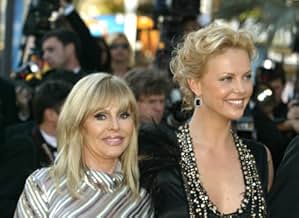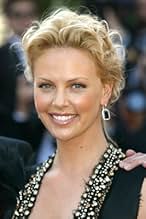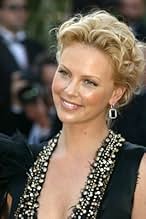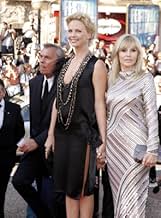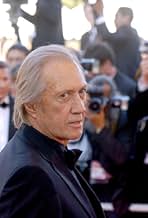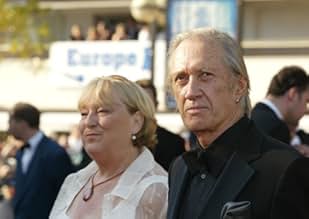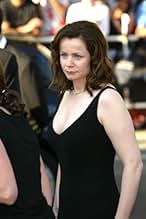NOTE IMDb
6,9/10
16 k
MA NOTE
L'adaptation cinématographique du livre de Roger Lewis sur l'acteur célèbre pour son rôle de l'Inspecteur Clouseau dans les films de la Panthère Rose.L'adaptation cinématographique du livre de Roger Lewis sur l'acteur célèbre pour son rôle de l'Inspecteur Clouseau dans les films de la Panthère Rose.L'adaptation cinématographique du livre de Roger Lewis sur l'acteur célèbre pour son rôle de l'Inspecteur Clouseau dans les films de la Panthère Rose.
- Réalisation
- Scénario
- Casting principal
- Récompensé par 9 Primetime Emmys
- 31 victoires et 35 nominations au total
Edward Tudor-Pole
- Spike Milligan
- (as Edward Tudor Pole)
Avis à la une
Biopics are a devilish thing. Is as if the subject himself boycotted the operation from beyond the grave. The ultimate breach of privacy, isn't it? One feels like a voyeur, compelled and revolted at the same time. Goeffrey Rush's brilliant portrayal makes things even worse, I mean better, no I meant worse. A life of massive ups and downs for public consumption. Peter Sellers with a Cary Grant complex and a talent bigger than himself told in bits and pieces. To the ones who know about Sellers is a rather frustrating experience. Dr.Strangelove yes but not Lolita? The relationship with Blake Edwards deserves a movie of its own. The first massive heart attack was during Billy Wilder's "Kiss Me Stupid" but there is no mention of that. I know that to compress such a life without a structure within a two hour film it's an impossible task so what we're left with is a courageous attempt at tell us the sickly existence of one the greatest that ever was, a superlative performance by Goeffrey Rush, an astonishing Charlize Theron as Britt Eckland and very little else. I suppose that should be enough. Yes, it should, shouldn't it?
It might be impossible to capture every aspect of a man's life in a two-hour film (A & E Biography frequently fails at this in the one-hour format with the bigger stars) while giving everything its proper weight. Peter Sellers' life is of such extraordinary dimensions that "The Life and Death of Peter Sellers" even fails at being a scrapbook. This is not necessarily the film's fault; the movie is mostly well-cast (only John Lithgow as Blake Edwards didn't seem quite right) and beautiful to look at, from the opening credits on.
The movie serves mostly as a sampler of Sellers' oddball behavior. Incidents are selected from his life (or slightly fabricated) to stand for the whole; one slap across Britt Ekland's face is meant to represent a lifetime of spousal abuse, but those unfamiliar with Sellers personal life will assume that he was merely temperamental off-camera. In fact, it doesn't even come close to the truth: Anne Sellers reported that Peter once fought her for 14 hours straight (she took a nap in between) and Britt says Peter pointed a loaded gun at her in Rome, only capitulating after she told him 'if you shoot me, you'll ruin your own career'. His mistreatment of his family is grossly underweighted compared to such trivial items as Sellers not quite getting the Texas accent required for the bomber role in Dr. Strangelove, then faking a broken leg to Kubrick so he wouldn't be able to climb the ladder to the elevated cockpit on the movie set and avoid having to admit his failure with the voice. Other things are not clearly explained; for instance, that the "clairvoyant" Maurice Woodruff was in the employ of the movie studios to get Sellers to do the pictures they wanted him to do, or the fantasy sequence after his seven consecutive heart attacks in LA, which relates to Sellers insisting that he had an out-of-body experience during he time his heart stopped. The asides to the camera by the Kubrick and Bill Sellers characters, and Sellers (in funny voices) indicate the director straining for depth; perhaps a documentary on Sellers' life would have been better.
On the plus side, Geoffrey Rush is nothing short of superb as Sellers. Everything about Sellers seems exactly right, including the voice, which is no small feat, since I don't think Sellers is all that doable. The voice certainly wouldn't be recognized as Sellers if done out of context, say, as a stage impersonation, yet it works, even though I can't really recall what Sellers' actual voice did sound like. (It was this lack of personality that made him such a great instrument for creating characters) Charlize Theron is also a dead ringer for Britt, though she's not given much to do.
This movie is mostly for Peter Sellers enthusiasts, like myself, who can pick out the obscure trivia (like the Texas accent sequence), explain it to other people and feel superior. The movie isn't bad, really; its extremely well-acted and well-crafted, but it fails miserably at explaining the man. Why was he the way he was? How does one reconcile his genius with his brutality and selfishness. Sellers is of such depth and magnitude that a two-hour movie just doesn't cut it. For a true picture of the man, I would recommend the Roger Lewis book on which the movie is "based", Ed Sikov's more sympathetic biography on Sellers, and Michael Sellers' memoir "P.S. I Love You". Sellers once described himself as being an "empty vessel", a body through which one of his great characters came to life. I feel the same way about this movie.
The movie serves mostly as a sampler of Sellers' oddball behavior. Incidents are selected from his life (or slightly fabricated) to stand for the whole; one slap across Britt Ekland's face is meant to represent a lifetime of spousal abuse, but those unfamiliar with Sellers personal life will assume that he was merely temperamental off-camera. In fact, it doesn't even come close to the truth: Anne Sellers reported that Peter once fought her for 14 hours straight (she took a nap in between) and Britt says Peter pointed a loaded gun at her in Rome, only capitulating after she told him 'if you shoot me, you'll ruin your own career'. His mistreatment of his family is grossly underweighted compared to such trivial items as Sellers not quite getting the Texas accent required for the bomber role in Dr. Strangelove, then faking a broken leg to Kubrick so he wouldn't be able to climb the ladder to the elevated cockpit on the movie set and avoid having to admit his failure with the voice. Other things are not clearly explained; for instance, that the "clairvoyant" Maurice Woodruff was in the employ of the movie studios to get Sellers to do the pictures they wanted him to do, or the fantasy sequence after his seven consecutive heart attacks in LA, which relates to Sellers insisting that he had an out-of-body experience during he time his heart stopped. The asides to the camera by the Kubrick and Bill Sellers characters, and Sellers (in funny voices) indicate the director straining for depth; perhaps a documentary on Sellers' life would have been better.
On the plus side, Geoffrey Rush is nothing short of superb as Sellers. Everything about Sellers seems exactly right, including the voice, which is no small feat, since I don't think Sellers is all that doable. The voice certainly wouldn't be recognized as Sellers if done out of context, say, as a stage impersonation, yet it works, even though I can't really recall what Sellers' actual voice did sound like. (It was this lack of personality that made him such a great instrument for creating characters) Charlize Theron is also a dead ringer for Britt, though she's not given much to do.
This movie is mostly for Peter Sellers enthusiasts, like myself, who can pick out the obscure trivia (like the Texas accent sequence), explain it to other people and feel superior. The movie isn't bad, really; its extremely well-acted and well-crafted, but it fails miserably at explaining the man. Why was he the way he was? How does one reconcile his genius with his brutality and selfishness. Sellers is of such depth and magnitude that a two-hour movie just doesn't cut it. For a true picture of the man, I would recommend the Roger Lewis book on which the movie is "based", Ed Sikov's more sympathetic biography on Sellers, and Michael Sellers' memoir "P.S. I Love You". Sellers once described himself as being an "empty vessel", a body through which one of his great characters came to life. I feel the same way about this movie.
Stephen Hopkins' "The Life and Death of Peter Sellers" is a monumental film that undertook the difficult task of understanding the late Peter Sellers. This unique actor, with such a complicated personality and who lived such a turbulent life, comes alive in this HBO production based on the book by Roger Lewis, with an adaptation by Christopher Markus.
Peter Sellers covered quite a lot of ground during his life. He was one of the best actors working in the England of the fifties, working in all those charming comedies that made him a star in his native land, but alas, was not well known in America because he had not yet been hired by Hollywood until his "discovery" by director Blake Edwards, who offered him the part of Inspector Clouseau after Peter Ustinov had turned down the role.
Prior to his worldwide recognition, Mr. Sellers had to work a lot in order to make ends meet. Life with his first wife Anne came to an abrupt end, when he discovered she had fallen for the interior decorator the couple had hired. Then, there is the fascinating episode with Sophia Loren, in which Mr. Sellers, in his mind, begins to think he is in love with her, only to be rebuked by Ms. Loren, a woman who was happily married to Carlo Ponti, and had no desire to become the second Mrs. Sellers.
The third woman in Mr. Sellers life is the beautiful, but much younger, Britt Ekland. From the start, one can figure this union was not to last. The age difference and the different cultures indicate these two were completely mismatched, as we get to watch in painful detail how the marriage disintegrates.
Mr. Hopkins makes his star, Geoffrey Rush, assume a lot of roles in addition of the main one, Peter Sellers. Geoffrey Rush shows his versatility in playing them with great style. His biggest achievement seems to be how he captures the essence of Peter Sellers, the man, and expose him to us in all his complexity.
The acting is superb. Emily Watson and Charlize Theron are seen as Anne and Britt, two women that left their mark in the life of Mr. Sellers. Both are excellent in the film. Miriam Margoyles plays Peg Sellers. John Lighgow is Blake Edwards, the man who elevated the actor to an international acclaim.
The film is a documentary, as well as a biopic about this man who gave a lot of joy to movie fans through his films. Geoffrey Rush has to be thanked for bringing him to life, as well as the director, Stephen Hopkins for giving us an understanding on what it was to be Peter Sellers.
Peter Sellers covered quite a lot of ground during his life. He was one of the best actors working in the England of the fifties, working in all those charming comedies that made him a star in his native land, but alas, was not well known in America because he had not yet been hired by Hollywood until his "discovery" by director Blake Edwards, who offered him the part of Inspector Clouseau after Peter Ustinov had turned down the role.
Prior to his worldwide recognition, Mr. Sellers had to work a lot in order to make ends meet. Life with his first wife Anne came to an abrupt end, when he discovered she had fallen for the interior decorator the couple had hired. Then, there is the fascinating episode with Sophia Loren, in which Mr. Sellers, in his mind, begins to think he is in love with her, only to be rebuked by Ms. Loren, a woman who was happily married to Carlo Ponti, and had no desire to become the second Mrs. Sellers.
The third woman in Mr. Sellers life is the beautiful, but much younger, Britt Ekland. From the start, one can figure this union was not to last. The age difference and the different cultures indicate these two were completely mismatched, as we get to watch in painful detail how the marriage disintegrates.
Mr. Hopkins makes his star, Geoffrey Rush, assume a lot of roles in addition of the main one, Peter Sellers. Geoffrey Rush shows his versatility in playing them with great style. His biggest achievement seems to be how he captures the essence of Peter Sellers, the man, and expose him to us in all his complexity.
The acting is superb. Emily Watson and Charlize Theron are seen as Anne and Britt, two women that left their mark in the life of Mr. Sellers. Both are excellent in the film. Miriam Margoyles plays Peg Sellers. John Lighgow is Blake Edwards, the man who elevated the actor to an international acclaim.
The film is a documentary, as well as a biopic about this man who gave a lot of joy to movie fans through his films. Geoffrey Rush has to be thanked for bringing him to life, as well as the director, Stephen Hopkins for giving us an understanding on what it was to be Peter Sellers.
Well, how do you rate a biographical movie? I am really not a Peter Sellers buf so I couldn't tell how accurate the movie was. Knowing how these kind of movies are made I am sure it is full of little overdramatisations :) The only measure of quality is the performance of the lead actor and I think Geoffrey Rush did a fabulous job. He talked, looked and moved like Peter Sellers.
However, I couldn't watch more than 30 minutes of the film. The movie portrays a horrible little man, egocentric to the point of disbelief, abusing his wives and children and having no real remorse. While the movie is well done and the acting superb, I couldn't stand the idea of another hour and a half of watching the same type of behavior, so I missed on John Lithgow, Stanley Tucci and other great actors in the cast.
However, I couldn't watch more than 30 minutes of the film. The movie portrays a horrible little man, egocentric to the point of disbelief, abusing his wives and children and having no real remorse. While the movie is well done and the acting superb, I couldn't stand the idea of another hour and a half of watching the same type of behavior, so I missed on John Lithgow, Stanley Tucci and other great actors in the cast.
The Life and Death of Peter Sellers has to be one of the most creative, complex and revealing non-documentary movies ever made about an actual person, living or dead, and the inspired casting of Geoffrey Rush is spot on - he's magnificent in all the various and sundry Sellers guises, especially the ones from Dr. Strangelove and The Pink Panther's bumbling inspector. The rest of the casting is excellent too, particularly Charlize Theron as the second "B.E." in Seller's life, Britt Ekland.
The thing I liked most about this movie was how the script let us see how Sellers created his characters - how he was constantly "in character" or inbetween characters. He admits in the movie to being an empty vessel, with no personality of his own; this is what allowed him to be such an insufferably cruel bastard to all the people who were closest to him: he used his immersive, endlessly obsessive artistic process as a weapon and, ultimately, as a substitute for being human.
It's always brutally hard as an artist to find the balance - you have to be true to your work, naturally, and as an actor especially you're constantly redefining your inner reality, but you can't do it at the expense of the people who love you and whom you profess to love; there has to be emotional and mental discipline otherwise you become psychotically self-indulgent, as this film showed Sellers to be. The most poignant scene in the movie for me was when Sellers, in his typically childish and deranged state, tells his little daughter, "I'm an empty shell, there's nobody inside," words to that effect, and she answers, with a sad wisdom that no child should have to learn to possess, "Yes, daddy."
The thing I liked most about this movie was how the script let us see how Sellers created his characters - how he was constantly "in character" or inbetween characters. He admits in the movie to being an empty vessel, with no personality of his own; this is what allowed him to be such an insufferably cruel bastard to all the people who were closest to him: he used his immersive, endlessly obsessive artistic process as a weapon and, ultimately, as a substitute for being human.
It's always brutally hard as an artist to find the balance - you have to be true to your work, naturally, and as an actor especially you're constantly redefining your inner reality, but you can't do it at the expense of the people who love you and whom you profess to love; there has to be emotional and mental discipline otherwise you become psychotically self-indulgent, as this film showed Sellers to be. The most poignant scene in the movie for me was when Sellers, in his typically childish and deranged state, tells his little daughter, "I'm an empty shell, there's nobody inside," words to that effect, and she answers, with a sad wisdom that no child should have to learn to possess, "Yes, daddy."
Le saviez-vous
- AnecdotesPeter Sellers did not give a pony to his son Michael as shown in the film. He gave it to his younger daughter by Britt Ekland several years later. The change was made in order to compress events for dramatic purposes. According to the screenwriter, the horse disappeared after a couple of weeks, and when his daughter wanted to know where it was, he replied that he had given it to Princess Margaret.
- GaffesA cinema marquee advertises Ghost in the Noonday Sun (1974) despite the fact that this film was shelved until after Sellers' death and never received a theatrical release. Similarly, Le blockhaus (1973) didn't have a U.K. theatrical release but is shown playing on a London marquee.
- Citations
[At Peter's wedding to the Swedish starlet Britt Ekland]
Peg Sellers: You've only known that bleedin' Nazi for 3 weeks.
Peter Sellers: Peg, I couldn't be happier.
Peg Sellers: Why are you making the same mistake all over again?
Peter Sellers: Because, my love, they won't let me marry you.
- Crédits fousThe frame freezes and the end credits start. After some informations about the last part of life of Peter Sellers have scrolled up the screen, the credits stop and the camera suddenly pulls back, revealing Geoffrey Rush watching the end titles sitting in front of a monitor on a studio set. He turns toward the camera, waves, gets up, leaves the set and walks to a trailer. The camera tries to follow him inside, but he turns and says "You can't come in here". The door closes, and the camera zooms in on the sign with the name "Peter Sellers". The film again fades to black and we see the rest of the end credits.
- Versions alternativesThe BBC broadcast a version with some scenes rearranged, some scenes shortened and a few other edits:
- The montage of Peter Sellers' earlier films is cut together with the scene where he moves into a big new house with Anne and the children. Also the song 'I Haven't Told Her, She Hasn't Told Me' sung by Peter is played instead of Frank Sinatra's 'Fly Me to the Moon'.
- The first Maurice Woodruff scene and the car showroom scene are moved ahead to after Peter's father's death scene, swapping places with the scene where he phones Harry Secombe asking if he wants to come over for a beer. The car showroom scene also replaces the Shirley Bassey song 'Big Spender' with incidental music composed for the film.
- The first Maurice Woodruff scene begins with a shot of Peter smoking a cigarette in the waiting room before cutting to a shot of Woodruff's book, which is where this scene begins in the original version.
- The Harry Secombe phone call scene is shortened, cutting out the bit where Peter tells his son to go to his room.
- A shot of Peter as Dr. Strangelove saying "Boom" is added after the Dr. Strangelove filming scenes.
- Peter and Britt Ekland's wedding reception scene is shortened slightly, the shots of the children on the carousel are cut out.
- The scene where Peter drives Britt to the hospital to give birth is shortened, cutting out footage of the car going past a church, pulling out in front of another car and Peter telling Britt to keep breathing.
- The very brief scene of Peter seeing a plastic surgeon followed by shots of him in a makeup chair and taking pills is cut out.
- The scene where Maurice Woodruff tries to get Peter to do another Pink Panther film is shortened, the bit where he channels Peter's mother and tells him to do the film is cut out. Also a different take is used when Maurice gets out the film script, instead of saying "Are you absolutely sure about that?", he says "Are you sure about that?".
- The scene of Peter in his trailer dressed as the old salty sea dog is moved back to in between the scenes of him agreeing to make The Pink Panther Strikes Again and the film's premiere, making it look as if this character is part of that film when actually he appears in Revenge of the Pink Panther. In the original version this scene takes place later on, after a shot of Peter picking up a Revenge of the Pink Panther script. Whereas this version changes this shot to show a Being There script.
- The scene of Peter in character as Blake Edwards is shortened. The line at the end of the scene "What did he do after me? The only thing he never gave up on" is cut out.
- The montage of Peter doing character preparation for Being There and burning his old movie stuff is arranged differently. The overlaid shots of him doing The Goon Show and playing Strangelove, Clouseau are removed, although a shot of him burning a photo of President Merkin Muffley and a shot of the Being There novel in his pocket are added.
- In the first shot of Blake Edwards waiting for Peter at the restaurant, instead of starting with a close up of the script for The Romance of the Pink Panther and cutting just before a waiter pours water into a glass, it starts with the water pouring into the glass, using a different part of this same take.
- At the ending, when after the closing text it zooms out to show Peter watching it on a monitor and getting up to go to his trailer after which the end credits roll, this version inserts after the text another shot of Peter standing in the snow, then the cast list rolls before the zoom out to Peter watching it on a monitor. Also in this version The Kinks' song 'A Well Respected Man' starts playing as Peter gets up to go to his trailer, in the original version incidental music is played here instead and 'A Well Respected Man' doesn't start playing until the credits roll.
- ConnexionsFeatured in At the Movies: Épisode #1.9 (2004)
- Bandes originalesWhat's New Pussycat
Written by Burt Bacharach and Hal David
Performed by Tom Jones
Courtesy of The Decca Music Group Ltd.
Licensed by kind permission from the Universal Film & TV Licensing Division
Meilleurs choix
Connectez-vous pour évaluer et suivre la liste de favoris afin de recevoir des recommandations personnalisées
- How long is The Life and Death of Peter Sellers?Alimenté par Alexa
Détails
- Date de sortie
- Pays d’origine
- Sites officiels
- Langue
- Aussi connu sous le nom de
- La vie et la mort de Peter Sellers
- Lieux de tournage
- 33 Portland Place, Marylebone, Londres, Angleterre, Royaume-Uni(Peter Sellers' London flat)
- Sociétés de production
- Voir plus de crédits d'entreprise sur IMDbPro
Box-office
- Montant brut mondial
- 1 789 336 $US
- Durée2 heures 2 minutes
- Couleur
- Mixage
- Rapport de forme
- 1.85 : 1
Contribuer à cette page
Suggérer une modification ou ajouter du contenu manquant



